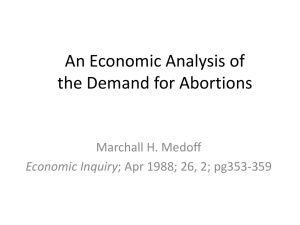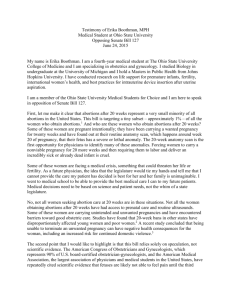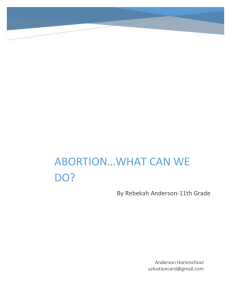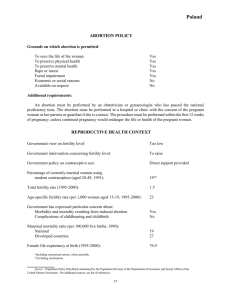botswa1 - the United Nations
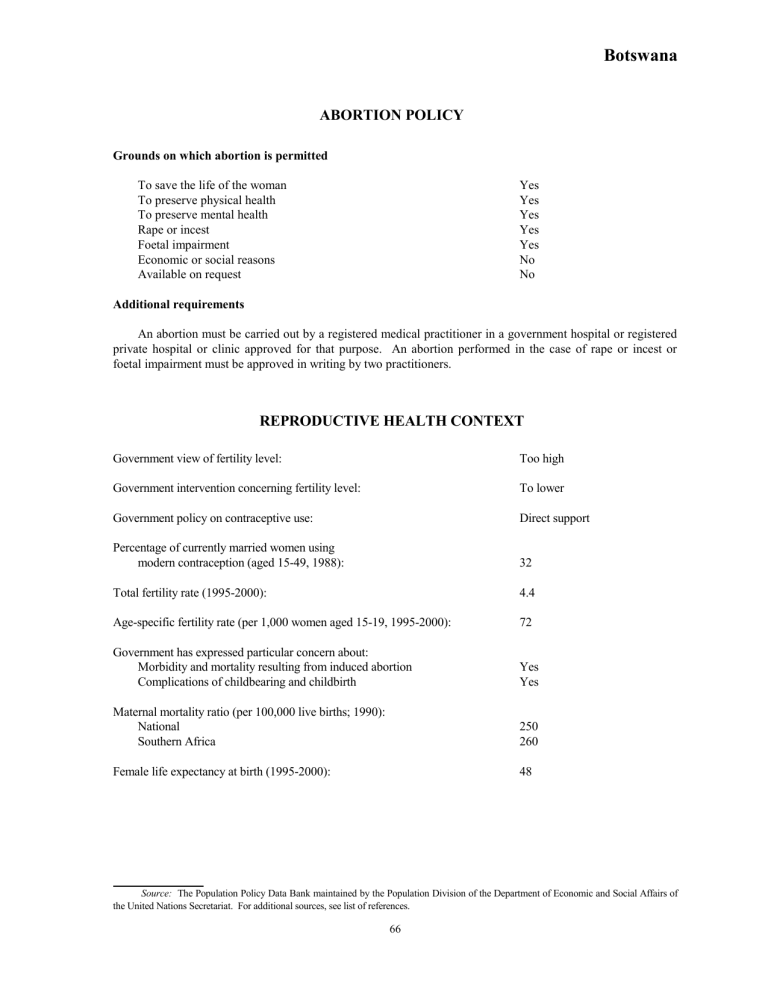
Botswana
ABORTION POLICY
Grounds on which abortion is permitted
To save the life of the woman
To preserve physical health
To preserve mental health
Rape or incest
Foetal impairment
Yes
Yes
Yes
Yes
Yes
Economic or social reasons
Available on request
Additional requirements
No
No
An abortion must be carried out by a registered medical practitioner in a government hospital or registered private hospital or clinic approved for that purpose. An abortion performed in the case of rape or incest or foetal impairment must be approved in writing by two practitioners.
REPRODUCTIVE HEALTH CONTEXT
Government view of fertility level:
Government intervention concerning fertility level:
Government policy on contraceptive use:
Percentage of currently married women using modern contraception (aged 15-49, 1988):
Total fertility rate (1995-2000):
Age-specific fertility rate (per 1,000 women aged 15-19, 1995-2000):
Government has expressed particular concern about:
Morbidity and mortality resulting from induced abortion
Complications of childbearing and childbirth
Maternal mortality ratio (per 100,000 live births; 1990):
National
Southern Africa
Female life expectancy at birth (1995-2000):
Too high
To lower
Direct support
32
4.4
72
Yes
Yes
250
260
48
Source: The Population Policy Data Bank maintained by the Population Division of the Department of Economic and Social Affairs of the United Nations Secretariat. For additional sources, see list of references.
66
Botswana
BACKGROUND
Until 1991, abortion was governed by the provisions of the Penal Code of Botswana, enacted in 1964 and modeled on the Offences Against the Person Act 1861 (United Kingdom). No exceptions were expressed to a general prohibition on the performance of abortions, although under the general criminal principles of necessity, an abortion was allowed if performed in order to save the pregnant woman’s life.
Persons who performed abortions and women who consented to them were subject to imprisonment.
In the 1980s, following requests from members of the medical profession for re-evaluation of the law, the Government began drafting a bill to this end, which it sent to Parliament in 1990. The Government’s action was based on its concern for the health of women, as evidenced by high rates of maternal mortality and morbidity. Some 3,700 women were officially treated for the complications of illegal abortion in
1992; at least 14 per cent of maternal mortality was estimated to result from unsafe abortion; and some 200 deaths per year were attributed to illegally performed abortions. Despite determined opposition, the bill was approved by Parliament and signed by the President of Botswana in October 1991.
The new law adds language to the Penal Code, setting forth exceptions to the general prohibition against the performance of abortions. Under it there are three exceptions: (a) when the medical practitioner carrying out the abortion is satisfied that the pregnancy is the result of rape, defilement, or incest; (b) when the continuance of the pregnancy would involve risk to the life of the pregnant woman or injury to her physical or mental health; and (c) when established evidence shows that there is substantial risk that the child would suffer from or later develop such serious physical or mental abnormality or disease as to be seriously handicapped. The abortion must be carried out within the first sixteen weeks of pregnancy by a registered medical practitioner in a Government hospital or registered private hospital or clinic approved for that purpose, and in the cases of (b) and (c) two practitioners must approve the abortion in writing.
Despite the enactment of this legislation, which is one of the most liberal in sub-Saharan Africa, concerns persist about the effects of unsafe abortion on women’s health. A recent report issued by the
Botswana Department of Women’s Affairs concluded that bureaucratic delays and “far-flung health clinics” still encouraged illegal backstreet abortions. Although data is lacking, reports indicate that, despite the new abortion law, illegal abortions are still common and extremely risky and that physicians often refuse to authorize abortions in situations that clearly fall within those intended by the law. The difficulties have been attributed to the lack of clear procedures to be followed in obtaining permission for an abortion; the uncooperative attitude of many physicians; the absence of a definition of “acceptable evidence” that a pregnancy is the result of rape, defilement, or incest; the failure of the law to address the legal situation of minors seeking an abortion; the scarcity of approved places where abortions can be legally performed; the shortage of medical practitioners to perform abortions; and the difficulty of access experienced by many rural women. The report of the Department of Women’s Affairs called for amendment of the law, including the replacement of the two-physician approval requirement with a one-physician requirement, and the provision of more accessible, safe and adequate facilities for the performance of abortion.
Whether the report will prompt re-evaluation of the law is unclear, given the controversial nature of abortion in Botswana.
Source: The Population Policy Data Bank maintained by the Population Division of the Department of Economic and Social Affairs of the United Nations Secretariat. For additional sources, see list of references.
67
